The peace He gave to His disciples in this Upper Room
26. Januar 2012
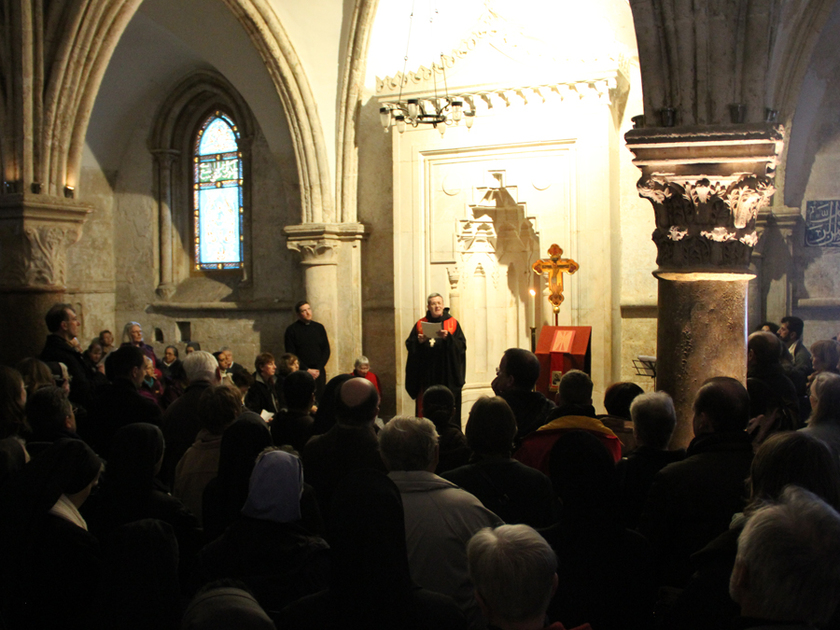 Gebet um die Einheit der Christen (2012).
Gebet um die Einheit der Christen (2012).
My brothers and sisters in Christ,
The general theme suggested for our reflection in this year’s Week of Prayer for Christian Unity is our transformation through life in Christ. It is particularly appropriate this evening for we stand together at this site, where according to tradition, the Lord instituted the transforming sacrament of the Eucharist and penance, appeared to his disciples and sent them the promised Holy Spirit.
The disciples themselves were not in very good shape after the death of Jesus! They were frightened, unsure of themselves, disappointed and full of doubts about whether God really was looking after them. After all, had they not so recently witnessed the apparent failure of Jesus, the failure of the one whom they had followed faithfully from Galilee? They knew that he had been stripped, flogged, hung on the cross and placed in a tomb for burial. Unlike the holy women who followed him to Golgotha, they had of course not actually witnessed those events because they had abandoned him and run away in terror.
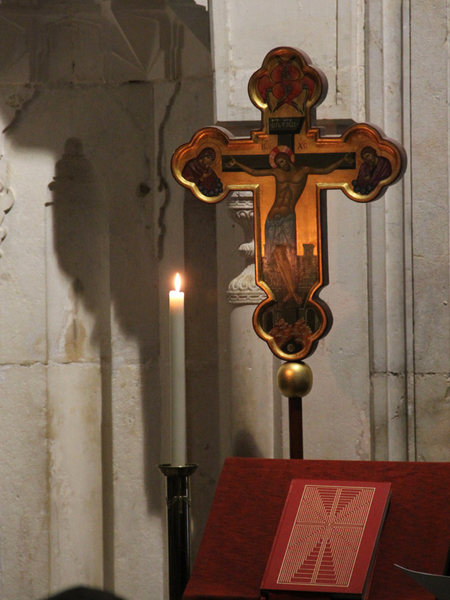 Im Abendmahlssaal.
The Gospel of Luke, in the marvelously crafted story of the two disciples who encountered Jesus on the road to Emmaus and at the breaking of bread, gives us a good insight into the depth of their hurt and disappointment. We can well imagine and identify with what they went through in those long dark hours of apparent failure and defeat.
Im Abendmahlssaal.
The Gospel of Luke, in the marvelously crafted story of the two disciples who encountered Jesus on the road to Emmaus and at the breaking of bread, gives us a good insight into the depth of their hurt and disappointment. We can well imagine and identify with what they went through in those long dark hours of apparent failure and defeat.
But then Jesus came and stood amongst them. Where there had been nothing but darkness and death suddenly all was light and life again. Each word, each moment of that vital encounter is significant. We can learn how our relationship with the risen Christ is truly life-transforming. Let me highlight a few significant points.
When the King of Glory wishes to come in, no earthly power and certainly not sin can ever prevent his coming.
First, we should note that the doors were closed for fear of the authorities. After all, if they had put the Master to death, what might they not do to his disciples? Imprisonment, torture and execution were the frightening demons roaming around outside, in the darkness of that night. But then Jesus came and stood amongst them. They were transformed by the encounter. There are always people who deny the resurrection of the Lord or who at least have great difficulty in affirming it.
But those of us who really do believe it must never cease to ask: how else did a group of terrified men hiding in a locked room suddenly become a group of martyrs, witnesses, prepared to go right back to the centre of power and challenge the same authorities who had so cruelly put their master to death? How could it be, that almost all those traumatized men would, within a few years, give up their very lives for Jesus and his Gospel?
Of course that is no direct proof of his resurrection. There is no such proof because Christ calls us to faith and faith is usually dark. But we must keep on asking ourselves as well as unbelievers: how can we explain what happened to those people in this Upper Room? Is it not that they really did encounter and experience the one – the only one – who has ever conquered death?
Peace be with you!
And what did Jesus tell them when he appeared to them in that locked room? Eirene/Shalom: “Peace be with you!” How different is Christ’s behavior from what so many of us would probably do in such a moment. He had been betrayed and abandoned by his followers, unjustly killed, indeed killed most cruelly. What a human reaction it would have been to rebuke them, attack them for their cowardice, throw it back in their faces and tell them that he had finished with them forever. But Jesus the Christ, the eternal Son of God made flesh, did not do that. “Peace” is what he wished them, peace is what he granted them.
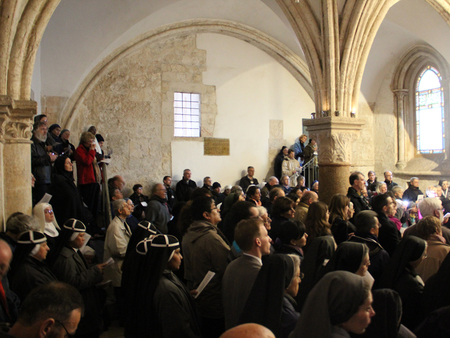 Im Abendmahlssaal.
Jesus was always the most authentic teacher. He alone among all the great prophets and religious geniuses of history completely fulfilled his own teaching and kept his word. We can accept his command to forgive our enemies and those who betray us because he himself did that. He did it firstly on the cross, when he prayed for his persecutors, but he did it also in the Upper Room when he forgave the disciples who had betrayed him. With every other religious teacher or prophet there is always a gap between what he says and what he does. But Jesus was no ordinary prophet or teacher. He is the incarnate Word and Wisdom of God. In him there is perfect harmony between his teaching and his life.
Im Abendmahlssaal.
Jesus was always the most authentic teacher. He alone among all the great prophets and religious geniuses of history completely fulfilled his own teaching and kept his word. We can accept his command to forgive our enemies and those who betray us because he himself did that. He did it firstly on the cross, when he prayed for his persecutors, but he did it also in the Upper Room when he forgave the disciples who had betrayed him. With every other religious teacher or prophet there is always a gap between what he says and what he does. But Jesus was no ordinary prophet or teacher. He is the incarnate Word and Wisdom of God. In him there is perfect harmony between his teaching and his life.
This wonderful peace that he alone can give is the fruit of forgiveness, for without forgiveness there can never be true peace. And so as the disciples rejoice in his forgiving, healing presence, he repeats his greeting a second time: “Peace be with you”.
He showed his hands...
Then he makes a simple but moving gesture. The Evangelist describes it with his usual tact and understatement: he showed them his hands and his side. Such simple words conceal a terrible reality. He showed them his hands and his side. Those hands had always been open, ready to give. Those same hands had blessed and multiplied the bread at Tabgha. They had healed the eyes of the blind and welcomed little children. Those were the hands pierced and torn by the iron of the nails hammered into them by Roman soldiers. Those hands had borne the weight of his body as he hung helplessly on the cross, drowning in his own blood, like so many so-called “common criminals”, those countless nameless ones crushed by the Roman Empire’s might.
He showed them also his side, opened by a lance, and they looked upon the one who had been pierced. In reaching out to touch that wounded body they received the forgiveness of their sins. In the scars of his death they found new life. Through the darkness of his crucifixion, the light of resurrection began to shine for them.
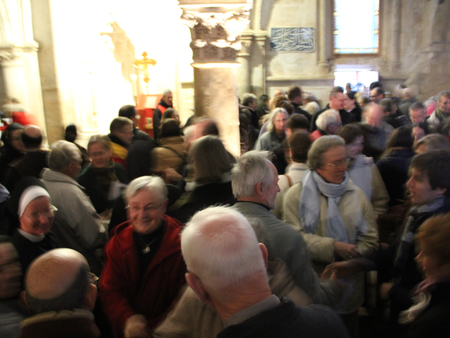 Im Abendmahlssaal.
My dear brothers and sisters in Christ, what we can we learn from him, in this place, in this year’s week of prayer for Christian unity?
Im Abendmahlssaal.
My dear brothers and sisters in Christ, what we can we learn from him, in this place, in this year’s week of prayer for Christian unity?
Jesus came and stood amongst them, though the doors were locked! That tells us something vitally important. No door made of wood, not any psychological or spiritual door, not any door closed by culture or society - no barrier whatsoever - can ever stop the entry of the risen Christ. When the King of Glory wishes to come in, no earthly power and certainly not sin can ever prevent his coming. Jesus is Lord of all the earth; he is the King of creation. He enters in sovereign freedom to begin his victorious reign.
We are so often like those disciples: frightened, unsure of ourselves, hiding like cowards. So often we betray him in our words and deeds. But the very divisions among the Christian communities – those shameful divisions among people who claim to follow one who died to bring all people into unity – they also cannot stop him coming in! Despite our many betrayals the Lord Jesus Christ is always at work amongst us. There is a fundamental, unbreakable unity among his followers that is deeper than our surface divisions: it is our unity in baptism, in witness, in prayer and in suffering. As Karl Barth once wrote: we are not asked to create the unity of the Church, but to discover that it already exists, despite what we have done to it!
We need to sing Kyrie Eleison for our offences before we too smugly and prematurely sing our Glorias and Alleluias.
Secondly, he showed them his wounds. He reminded them that his transforming victory came at a great price, the price of his own blood, the blood of a lamb predestined before the foundation of the world to suffer for our salvation. The wounded Jesus is the risen Christ. That is a vivid reminder that triumph comes not from human power or energy but from the power of the cross alone. When he breathed his Holy Spirit of forgiveness on them it was the same Spirit that had poured out of his side on Golgotha. The Spirit came only because Jesus had been glorified: but his glory began not only in the tomb but when as St. John tells us, they lifted him high on the cross.
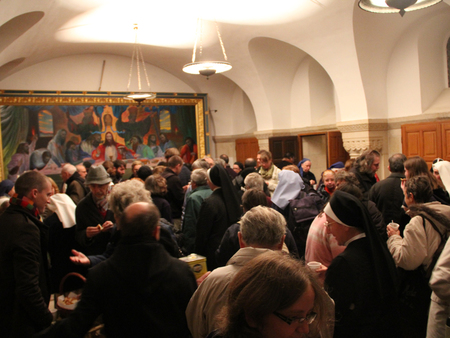 Empfang in der Abtei nach dem Gottesdienst.
So it is with us as churches and as Christians. It is only in and through our brokenness, our weakness, our vulnerability and our wounds that glory comes. It is only when we abandon our foolish triumphalism, our ecclesiastical egoism, only when we consent to be nothing that he will make us into something. He wishes to transform us into the radiant bride of the Apocalypse, the new and eternal Jerusalem coming down from heaven like a bride adorned for her husband. The Church was born here in the old Jerusalem, here in these places of covenant and betrayal, Pascha and Pentecost, Calvary and the empty tomb. But it will only become that glorious Church when its wounds are finally transfigured by his grace.
Empfang in der Abtei nach dem Gottesdienst.
So it is with us as churches and as Christians. It is only in and through our brokenness, our weakness, our vulnerability and our wounds that glory comes. It is only when we abandon our foolish triumphalism, our ecclesiastical egoism, only when we consent to be nothing that he will make us into something. He wishes to transform us into the radiant bride of the Apocalypse, the new and eternal Jerusalem coming down from heaven like a bride adorned for her husband. The Church was born here in the old Jerusalem, here in these places of covenant and betrayal, Pascha and Pentecost, Calvary and the empty tomb. But it will only become that glorious Church when its wounds are finally transfigured by his grace.
What we must do is humbly confess our sins and acknowledge our pathetic attempts at self-justification, confess our futile efforts to build our private kingdoms on earth through human effort, an impossible and ultimately sinful task. We have to uncover our wounds – our self-inflicted wounds - before him just he revealed his glorious, life-giving wounds to us. We need to sing Kyrie Eleison for our offences before we too smugly and prematurely sing our Glorias and Alleluias.
My brothers and sisters in Christ, here in this holy place, gathered in his name, let us reach out and touch him through our faith, reach out and touch him in our suffering brothers and sisters. Let us implore him to heal the wounds of sin and division that we have inflicted – and go on inflicting - on his body the Church.
Then let us joyfully go out into the world’s dark night, proclaiming that peace which he alone can give, the peace he gave to his disciples in this Upper Room, the peace he gives to us.
To him, wounded but glorified,
the Lord of the Church,
be all glory praise and thanksgiving,
now and forever.
Amen.